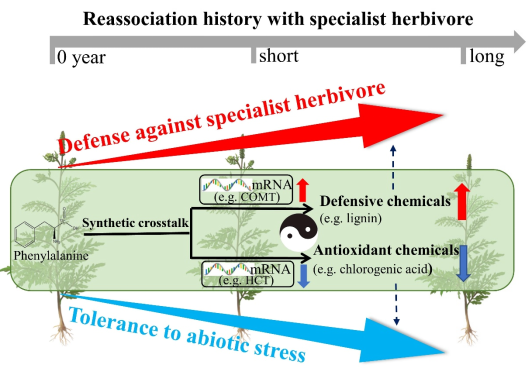The response and adaptation of invasive plants to abiotic and biotic stress is a major theme in invasive ecology and evolution. Release from enemies can lead to rapid evolution in invasive plants, including reduced metabolic investment in defense. Conversely, re-association with enemies can lead to renewed evolution of defense, but potential costs of this evolution are poorly documented. We report increased resistance of the invader Ambrosia artemisiifolia after re-association with a coevolved specialist herbivore, and this increase corresponds with reduced abiotic stress tolerance. Herbivore resistance was higher, but drought tolerance was lower in plants from populations with a longer re-association history, and this corresponded with changing phenylpropanoids involved in insect resistance and abiotic stress tolerance. These changes were corroborated by shifts in the expression of underlying biosynthetic genes and plant anti-oxidants. Together, our findings suggest rapid evolution of plant traits after re-association with co-evolved enemies, resulting in genetically based shifts in investment along trade-off axes between abiotic and biotic stress responses, providing insights into co-evolution, plant invasion, and biological control.

The finding was published entitled “Rapid evolutionary tradeoffs between resistance to herbivory and tolerance to abiotic stress in an invasive plant” in Ecology Letters (IF: 11.274). Associate Prof. Wandong Yin is the first author, Prof. Jianqing Ding is the corresponding author. The study was supported by the National Natural Science Foundation of China, the funding of Henan University and other partners.
Professor Jianqing Ding’s group has long been engaged in biological interactions and invasive mechanism of plants. Recently, Jianqing Ding’s group made a series of innovative research progress on interaction between invasive plants, insects and soil microorganisms, and the related findings were published at The ISME Journal (2018, 2021), Journal of Ecology (2018), Functional Ecology (2019), New Phytologist (2022).
Paper link: https://onlinelibrary.wiley.com/doi/full/10.1111/ele.14221

 News /
Content
News /
Content


